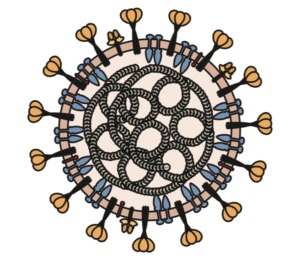The seven human coronaviruses have all originated from spillover events from a variety of nonhuman animals, including bats, rodents, and camels. Recently isolated coronaviruses from humans appear to have originated in pigs and dogs.
Three of 369 plasma samples collected between May 2014 and December 2015 in two schools in Haiti were found to be positive for coronavirus. All three children had fever, and one reported cough and abdominal pain. Whole genome sequence analysis of all three isolates revealed them to be porcine deltacoronaviruses (PDCoV). The human coronaviruses known to date are alpha- and betacoronaviruses.
PDCoV was first identified in 2012 in Hong Kong and then in 2014 in the Americas. The virus infects epithelial cells in the jejunum and ileum and the large intestine, leading to gastrointestinal symptoms. No PDCoV infections have been reported in Haitian domestic pigs.
The PDCoVs isolated four months apart from two children attending the same school are closely related to a virus isolated from pigs a year later in China. The other Haitian child was infected with PDCoV that is more closely related to an isolate from pigs in Arkansas from 2015. The implication of sequence analysis is that two separate zoonotic transmissions took place. How the viruses traveled from the US and China to Haiti is not clear.
All three PDCoV human isolates share a signature of amino acid changes in the viral ORF1a/b and spike proteins that is not seen in other PDCoV isolates. These changes might have been selected during reproduction in human hosts.
In a separate study, 8 of 301 nasopharyngeal swabs from patients hospitalized between 2017-2018 with pneumonia in Malaysia were shown to harbor canine coronavirus (CCoV), an alpha coronavirus. Close analysis of the genome sequence revealed that the virus is a recombinant, with most of the genome originating from CCoV and part of the spike from feline coronavirus.
Canine and feline coronaviruses cause moderate to severe intestinal disease in dogs and cats. The viruses have a worldwide distribution and given the prevalence of these animals as pets, it is not surprising that human infections may occur, albeit rarely. The eight patients who harbored this novel CoV were children living in areas where exposure to domestic animal and jungle wildlife would be expected, possibly explaining how the infections were acquired.
These human infections with porcine and canine coronaviruses appear to be isolated incidents which did not lead to extensive human transmission. Nevertheless the findings emphasize the public health threat of animal coronaviruses and the need for improving our surveillance for these viruses.


Dear Prof Vincent, The USA is a major producer and seller of swine breeders for the world, including Latin American countries and China. This may explain the common origin and transmission of a very similar virus in different apparently unrelated regions. See a little of this history here (https://encyclopediaofarkansas.net/entries/swine-industry-4339/). This also happens with other porcine viruses such as Porcine Parvovirus type 2 (PPV-2). In 2016 we published a study (https://doi.org/10.1128/genomeA.01627-15) with the complete genome of a PPV-2 from Brazil that is closely related to North American and Chinese viruses.
Pingback: Novel human coronaviruses from pigs and dogs - Virology Hub
I SUFFER FROM COLD SORES – THERE I’VE SAID IT, AND I HATE THEM. I AM LUCKY THAT I DON’T SUFFER THAT OFTEN (AND I KNOW SOME OF YOU ARE A LOT WORSE OFF AND GET THEM ALL OF THE TIME) SO HERE IS MY RVIEW OF TREATMENTS AND DRUGS THAT REALLY WORK YOU CAN VISIT OUR WEBSITE ON https://drwondersherbalhome.com/ YOU CAN CALL OR WHATSAPP OUR NUMBER ON +1(319)559-3535